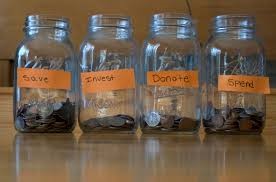
Today, a majority of consumers are experiencing some sort of financial difficulty causing a significant impact on their everyday lives. In fact, Americans carry more than $2 trillion in consumer debt and 30 percent of consumers report having no extra cash; making it impossible to escape the burden of living paycheck to paycheck.
April has been declared National Financial Literacy Month; and for good reason. Too many Americans are insufficiently educated about their personal finances.
The first and most important step in developing and following a financial plan is to examine your attitudes about money. Are you ready to accept responsibility for changing your financial situation? Do you believe that you can and will change the way you make financial decisions? Can you identify at least one benefit you hope to gain by changing your money management behavior? (http://www.financialliteracymonth.com/)
How to Keep a Budget
As soon as you start spending your own money, it’s time to start tracking your spending so that you can create and follow a personal budget. Keeping track of expenses, while sometimes tedious, is the best way to find out exactly where your money is going.
The simplest way to keep track of your finances, especially your cash, is the low-tech way, with a notebook and a pen. By carrying around the notebook with you, you can track exactly where every dollar is going–from a small coffee on your way to work to a spending splurge at the mall. If you’d prefer, on a daily or weekly basis, you can transfer your handwritten notes to a computer spreadsheet.
Once you have collected information for about a month, you’ll have a good baseline of information to use to create your personal budget. Some major categories that you’ll want to include are housing, utilities, insurance, food (groceries and dining out), gasoline, clothing, entertainment, and “other”. Using a spreadsheet program (such as Excel), online service, or other personal finance program, add up the expenses that you’ve been tracking, and then calculate what you’d like to budget for each category. Keep in mind that you’ll need to budget for some items, like gifts and automobile repairs, which will be necessary but won’t occur every month. You can either create a budget for each individual month, with variances for irregular expenses (e.g., heating expenses which will be higher in winter months, or car repairs and gifts), or a standard monthly budget where you include an average amount for expenses such as car repairs, heating, and gifts.
Your budget should also contain some personal savings amounts for retirement savings, college savings, an emergency fund, long-term savings, and any other savings goals you may have. Don’t wait until the end of the month to see what’s left – budget for your savings first.
Creating a personal budget is a good first step, but the most important thing is to follow the budget. Make time weekly or monthly to track your spending, and start to see if you are actually keeping to your budget. Using a personal finance program or an online service is probably the easiest way to do this on an ongoing basis, but make sure you continue to track where your cash is going. You may be surprised to find out how the frequent small amounts you spend actually add up to big money.
After tracking your personal budget, you may notice some areas where you’ll have to make changes. Don’t just increase your budget without considering alternatives. While you may have no choice, if prices or expenses go up, shop for better deals before giving in to the extra expenses.
Resources:
https://www.fdic.gov/consumers/consumer/moneysmart/index.html
https://www.fdic.gov/consumers/consumer/moneysmart/young.html
https://www.fdic.gov/consumers/consumer/moneysmart/olderadult.html
https://www.fdic.gov/consumers/consumer/moneysmart/business.html
https://www.moneymanagement.org/Budgeting-Tools/Credit-Articles/Money-and-Budgeting/Make-a-Personal-Budget-and-Keep-Track-of-Spending.aspx
https://www.moneymanagement.org/Community/Blogs/Blogging-for-Change/2009/April/FLM-Step-2-Gerri-Detweiler-discusses-the-importance-of-assessing-your-financial-situation.aspx?RCTAG=FLM
https://www.moneymanagement.org/Budgeting-Tools/Credit-Articles/Money-and-Budgeting/Five-Things-You-Need-to-Know-About-Money-and-Personal-Budgeting.aspx


